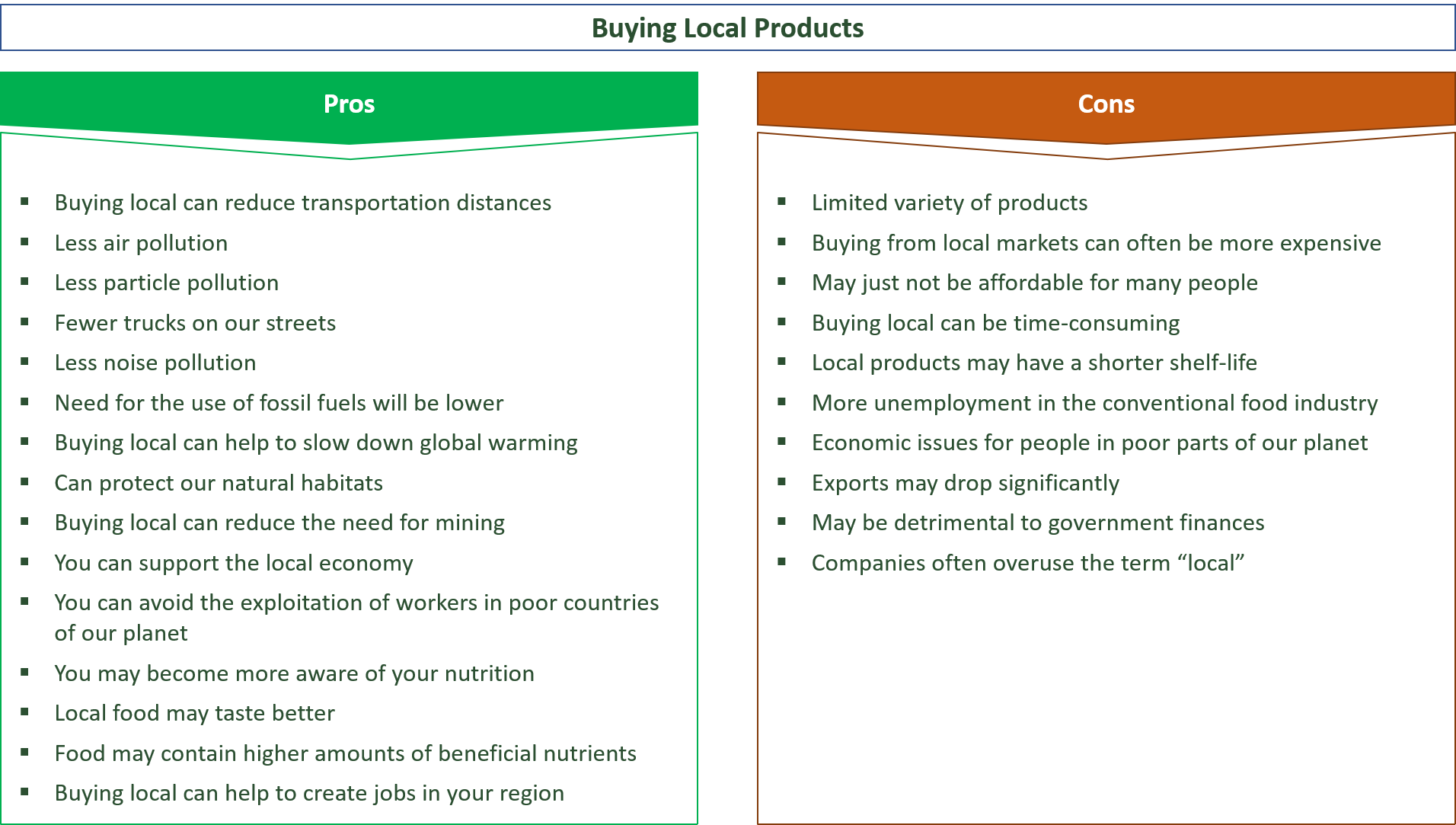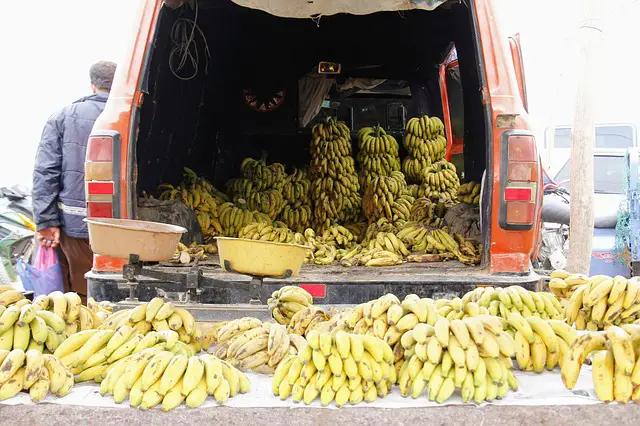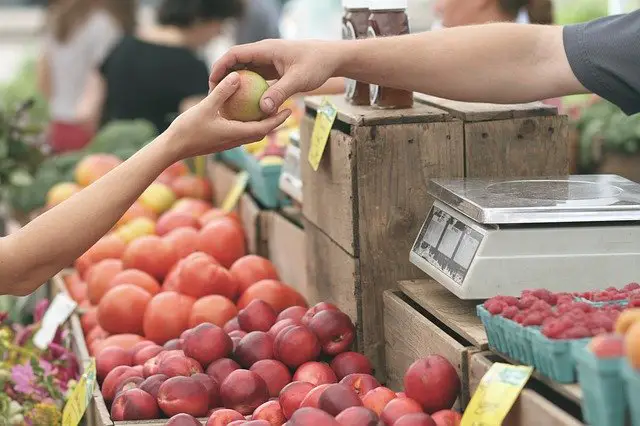“I buy my produce at the local farmer’s market, which is actually cheaper than shopping at the grocery store.”
Anna Getty, Actress
Pros and Cons of Buying Local Products

Buying local has become quite popular over the past years.
An increasing number of people want to rely on local foods and products instead of things that have been carried over quite long distances.
While local purchasing has many important advantages, there are still some problems related to this concept.
In this article, the pros and cons of buying local are discussed in detail.
Audio Lesson
Contents
Advantages of Buying Local
- Buying local can reduce transportation distances
- Less air pollution
- Less particle pollution
- Fewer trucks on our streets
- Less noise pollution
- Need for the use of fossil fuels will be lower
- Buying local can help to slow down global warming
- Can protect our natural habitats
- Buying local can reduce the need for mining
- You can support the local economy
- You can avoid the exploitation of workers in poor countries of our planet
- You may become more aware of your nutrition
- Local food may taste better
- Food may contain higher amounts of beneficial nutrients
- Buying local can help to create jobs in your region
- May also be better for animals
- Lower level of dependence on other countries regarding food supply
- Higher tax revenue for local municipalities
Buying local can reduce transportation distances
One important benefit of buying local is that it can greatly reduce transportation distances for foods and other products.
In fact, many products are shipped over quite long distances since they often come from foreign countries all over the world.
However, this shipping process over long distances is quite harmful to our environment and it can also be considered to be quite inefficient.
Therefore, we as humanity as a whole should improve the efficiency of our production processes and one way to do so is to buy as much local food as possible.
By doing so, fewer products have to be shipped over long distances, which implies an increase in the overall efficiency and will also greatly benefit our planet as well.
Less air pollution
Buying products that come from foreign countries far away also implies significant air pollution.
In the supply chain, products often have to be shipped over long distances until they finally end up in our stores.
However, these transportation processes also imply the emission of significant harmful substances into our air.
In fact, buying products from remote regions of our planet significantly lowers our overall air quality due to those emissions.
Hence, buying local can also help to improve our overall air quality and to protect ourselves against potential pulmonary diseases.
Less particle pollution
Another advantage of buying local is that it can help us to reduce particle pollution.
In the transportation process of foods and other products, significant amounts of harmful particles are emitted into our atmosphere.
In turn, this can also lead to serious health issues in the long run, including cardiovascular diseases and pulmonary issues.
Therefore, in order to do our health a favor, buying local can also help in this regard.
Fewer trucks on our streets
In general, if we buy more local products, there will also be fewer trucks on our streets.
In turn, chances are that we would be able to reduce the number of traffic jams as well.
This would make commuting much easier and could also save us plenty of precious time in the long run.
Consequently, if you are tired of excessive traffic and want to have fewer vehicles on our streets, you may want to buy local instead of food that comes from far away.
Less noise pollution
A reduction of vehicles on our streets also implies a reduction in noise pollution.
In fact, many metropolitan areas are quite noisy and if you live at a main street in those regions, chances are that you will suffer from significant noise all day long.
Even in the nighttime, you may wake up due to the excessive noise that comes from trucks.
Therefore, it may also be important to reduce the number of trucks on our streets since it would also mitigate the noise pollution problem to a certain extent.
Since we have seen that buying local can help to reduce the number of motor vehicles on our streets, it can also help us to lower noise levels from trucks to a certain extent.
Need for the use of fossil fuels will be lower
In general, if fewer trucks have to be used since people buy more local foods, also the need to use fossil fuels in the supply chain will be lower as well.
We all know that the use of fossil fuels can be quite harmful to our environment since it can contribute to serious resource depletion and other environmental issues.
It is therefore crucial that we minimize the use of fossil fuels in the supply chain as best as possible.
One way to do so is to buy more local products instead of products that have been manufactured far away.
Buying local can help to slow down global warming
If lower amounts of fossil fuels are used in the supply chain, chances are that we can also mitigate global warming to a certain extent.
We all know that the use of fossil fuels also implies the emission of harmful greenhouse gases into the atmosphere.
Those greenhouse gases are known to contribute to global warming.
Therefore, by buying local products and through the related greenhouse gas reduction, we can also slow down global warming.
Can protect our natural habitats
Another upside of buying local is that you can also protect our natural habitats.
Especially if you buy products from remote parts of our planet, chances are that this will be quite harmful to many animals and plants since their natural habitats are often destroyed in those regions.
A prominent example of this sad truth is the Amazon Rainforest.
In the Amazon, many trees are cut or burned down by locals in order to get more space for farming.
However, this also implies vast destruction of natural habitats.
In turn, many animal and plant species will lose their natural living conditions and will drop in population.
Many of them will also become endangered or even extinct in the near future.
Hence, it is crucial that we protect these natural habitats as best as possible.
One way to do so is to buy more local products since more natural habitats could be conserved all over the world due to that.
Buying local can reduce the need for mining
If you buy local, you can also indirectly contribute to a reduction in mining activities.
Since products do no longer have to be shipped over long distances, fewer amounts of fossil fuels have to be used and fewer amounts of fossil fuels have to be extracted out of the ground through mining.
Thus, by buying local products, you can also reduce the need for mining and can also mitigate the adverse environmental effects related to it.
You can support the local economy
In general, through buying local products, you can also support the local economy.
Local farmers often have it hard to compete in the fierce global markets since their products are often more expensive in production.
In turn, many of those farmers may go out of business sooner or later if we don’t support them by buying their products.
Consequently, through buying local products, you can also ensure the livelihood of many small local farmers.
You can avoid the exploitation of workers in poor countries of our planet
In the production processes of many products of our daily life, workers around the world often get exploited.
Quite often, companies pay those workers only rather low wages and workers also have to work for long hours every day.
In some cases, those workers do not even wear proper protection devices and may inhale harmful gases, which can lead to serious health conditions for those workers in the long run.
However, by buying local, you can refuse from contributing to this sort of exploitation.
You may become more aware of your nutrition
In general, if you buy more local products, chances are that you will also become more aware of what you eat.
Over time, you will learn about the different foods and what they can do for our body and our brain.
In turn, you will also be able to make your nutrition much healthier over time, which can greatly improve your overall quality of life and also increase your life expectancy in the long run.
Local food may taste better
Proponents of buying local food also often claim that local food tastes better.
In fact, this is true most of the time.
Local food can ripen in an optimal manner and can be harvested when the optimal time has come.
In contrast, food that is harvested far away has to be harvested in an unripe state since it will still have to be shipped for several days or even weeks.
Therefore, through buying local, you can also expect a much better food taste on average.
Food may contain higher amounts of beneficial nutrients
Since vegetables and fruits can be harvested in a ripe condition when they are sold on local markets, chances are that these crops will also contain much more beneficial nutrients and vitamins compared to food that comes from foreign countries and has to be harvested in an unripe condition.
Hence, also from an overall health perspective, buying local can make quite a lot of sense.
Buying local can help to create jobs in your region
If you buy local, you can also support the local companies.
In turn, those companies will be able to make higher profits and will also be able to employ more people in the long run.
Thus, if you want to support your family members and friends who may work in those agricultural jobs, you can do so by buying as much local food as possible.
May also be better for animals
Buying local can also improve the overall conditions of farm animals.
If animals don’t have to be carried over quite long distances before they finally reach the slaughterhouse, they will not have to suffer that much from stress.
In turn, this also implies that the meat from those animals will be of better quality if they are raised locally since those animals will not experience these high stress levels and their meat tends to be more tender due to that.
Lower level of dependence on other countries regarding food supply
Another key benefit of buying local products is that countries can lower the overall dependence on other countries regarding their food supply.
Dependence is never a good thing since it can lead to all sorts of issues for the dependent party.
Therefore, it can be quite beneficial for the whole country if the country produces more food in a local manner and doesn’t have to rely on importing large amounts of food anymore.
Higher tax revenue for local municipalities
By buying local food, you can support local farmers and other local companies.
In turn, those companies will make higher profits and the tax revenue for municipalities and for the government will also increase as well.
In turn, there will be more money for important infrastructure projects.
Therefore, you can do the whole country a favor if you buy local products on a regular basis.

Disadvantages of Buying Local
- Limited variety of products
- Buying from local markets can often be more expensive
- May just not be affordable for many people
- Buying local can be time-consuming
- Local products may have a shorter shelf-life
- More unemployment in the conventional food industry
- Economic issues for people in poor parts of our planet
- Exports may drop significantly
- May be detrimental to government finances
- Companies often overuse the term “local”
Limited variety of products
Apart from the many advantages of buying local products, there are also some problems with this concept.
For instance, there might just be a rather limited variety of local products available to you in conventional stores.
Quite often, if you want to have a big variety of local products, you have to go to specialized shops to get them.
However, many people in our current state of the world don’t want to take the time and effort to go to many different stores and may therefore not buy sufficient local products.
Buying from local markets can often be more expensive
Another problem with buying local is that local products are often much more expensive compared to products from foreign countries.
This is often due to the fact that wages in your home country will be much higher and also the production conditions may be worse compared to foreign third-world countries where wages are often quite low.
In turn, all this makes local products in the rich Western world much more expensive.
Hence, it is rather questionable whether the general public really wants to spend this additional money for their food.
May just not be affordable for many people
Especially for poor people in our society, it will simply not be possible to buy local products from a financial standpoint.
Those people often struggle quite a lot and will often only be able to afford the cheapest products.
In turn, we cannot expect those people to buy local products since they will simply not be able to afford those items.
Consequently, this may further prevent the expansion of local products since too many poor people will be forced to rely on the cheapest products in order to use their money as efficiently as possible.
Buying local can be time-consuming
Buying local not only implies that you will have to spend more money on your food and on various other products of your daily life, it also implies that you have to spend some time on it.
Quite often, you will have to visit additional stores to find the local products that you want to buy since many conventional stores do not offer those products.
Therefore, if you are really serious about buying local, make sure that you have sufficient time for it in your life.
In fact, many people in our nowadays society often do no longer have this time since they work in demanding jobs for long hours every day and if you are one of those people, chances are that you will simply not have the time to attend local markets since they will be closed when you finally finished work.
Local products may have a shorter shelf-life
Since local food is harvested in an almost entirely ripe state, those food products will often also only have a shorter shelf-life compared to products that are imported from foreign countries.
This also implies that you have to use those local food products within a shorter timeframe in order to avoid excessive amounts of food waste.
Consequently, make sure that you only buy as much local food as you are willing to eat in the next days in order to avoid food waste as best as possible.
More unemployment in the conventional food industry
While job opportunities in the local food market may increase if people buy more local products, the opposite is true for the conventional food market.
In fact, many people in the conventional food industry may lose their jobs if people rely too much on local products.
Therefore, the net effect of buying local food on the job market is rather unclear.
Economic issues for people in poor parts of our planet
Many people in poor developing countries also rely on farming as their major income source.
They also rely on selling and exporting their crops to foreign countries.
In turn, if the demand for those crops decreases since more people buy locally, this also implies that farmers will no longer be able to sell sufficient amounts of their crops and may therefore lose their livelihood.
Therefore, while buying local products can help to strengthen the local economy, it can also be detrimental to small farmers in poor parts of our planet.
Exports may drop significantly
In general, if people buy more local products, exports will also drop significantly over time.
However, this can be quite harmful to countries that greatly rely on exports as their main income source.
For instance, if country A is famous for exporting a certain good to country B and country B decides to produce this good on its own, country A will be in serious financial difficulties since it loses all the income from its exports.
Therefore, a drop in exports can also be detrimental to a country as a whole and also for the local population.
May be detrimental to government finances
If people buy more local goods, some countries around the world will also get into serious financial trouble due to the lower export levels.
In extreme cases, this can lead to sovereign default, which can be detrimental for the whole economy as well as for locals.
In turn, many people will suffer from serious poverty and the risk for social tensions and conflicts will increase as well.
Companies often overuse the term “local”
Many companies realized how important and lucrative the label “local” can really be for them.
In fact, many companies claim that their products are produced locally.
However, quite often, this only implies that the product has been put together in the respective region while the majority of parts for the respective product will still be produced in poor third-world countries.
Thus, make sure that you will not be misled by the label “local” and try to figure out if the product really meets the criteria for being truly locally manufactured throughout the whole supply chain.

Top 10 Buying Local Pros & Cons – Summary List
| Buying Local Pros | Buying Local Cons |
|---|---|
| Buying local can provide you with healthy food | Buying local goods can be expensive |
| Can help to reduce transportation distances | Buying local can be time-consuming |
| Buying local is good for our planet | Limited variety of local products |
| You can support local farmers | May hurt the economy of other countries |
| Better local employment opportunities | Job losses in poor foreign countries |
| Less air pollution if you buy local | Local products often have a shorter shelf-life |
| Less particle pollution | Poor parts of society often can’t afford it |
| Less noise pollution if you buy local goods | Exports may drop |
| Local food may taste better | “Local” may not actually always be local |
| Better nutritional values from local foods | May do more harm than good in some cases |
Should You Buy Local?
As we have seen before, there are various advantages and disadvantages of buying local products.
In my opinion, while we should rely on local production much more, we should also make sure that this will not hurt poor developing countries who rely on exports in order to feed the local population.
Sources
https://en.wikipedia.org/wiki/Local_purchasing
https://www.moneyunder30.com/how-to-buy-local-on-a-budget
https://www.bbcgoodfood.com/howto/guide/buy-local

About the author
My name is Andreas and my mission is to educate people of all ages about our environmental problems and how everyone can make a contribution to mitigate these issues.
As I went to university and got my Master’s degree in Economics, I did plenty of research in the field of Development Economics.
After finishing university, I traveled around the world. From this time on, I wanted to make a contribution to ensure a livable future for the next generations in every part of our beautiful planet.
Wanna make a contribution to save our environment? Share it!